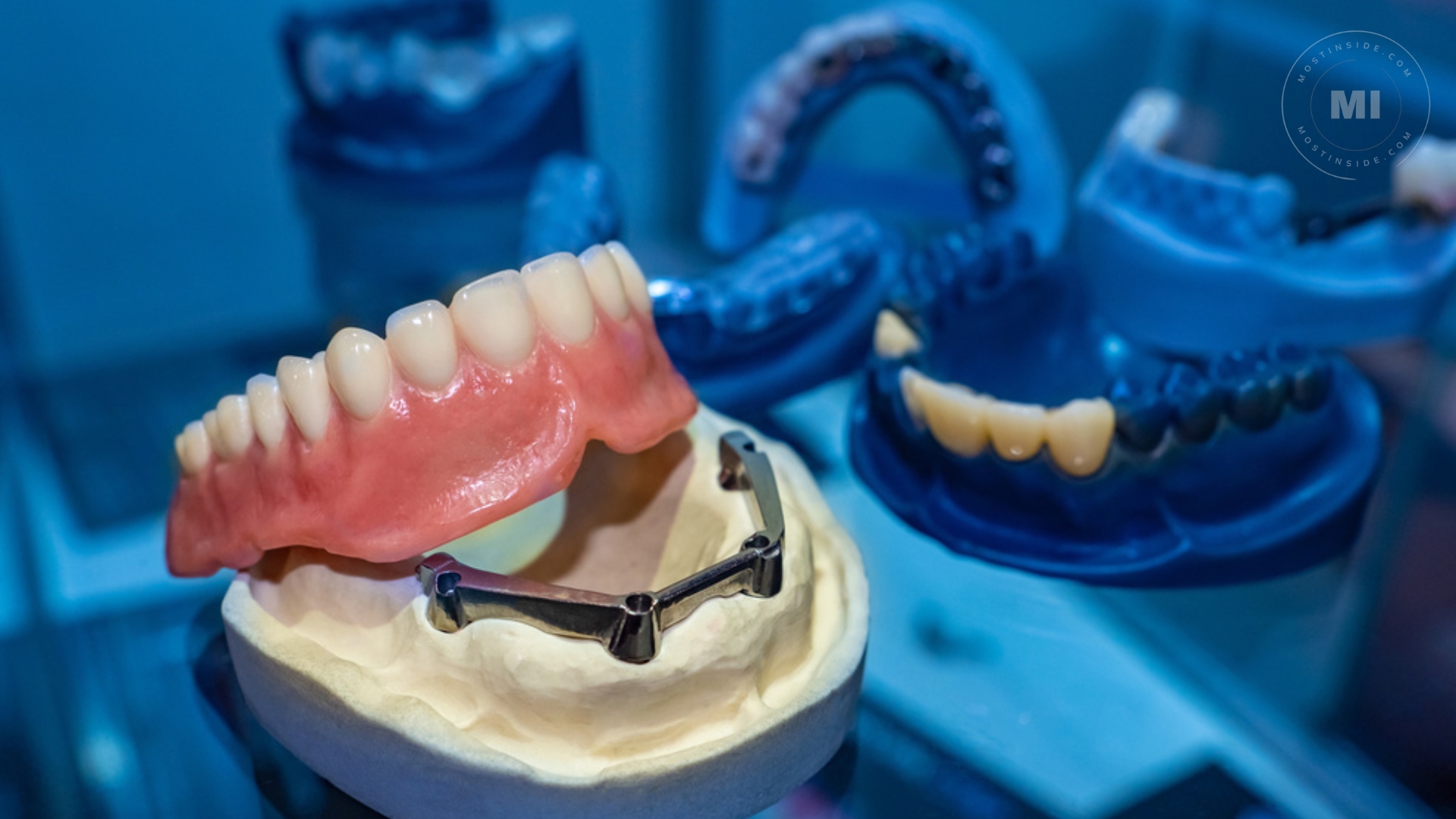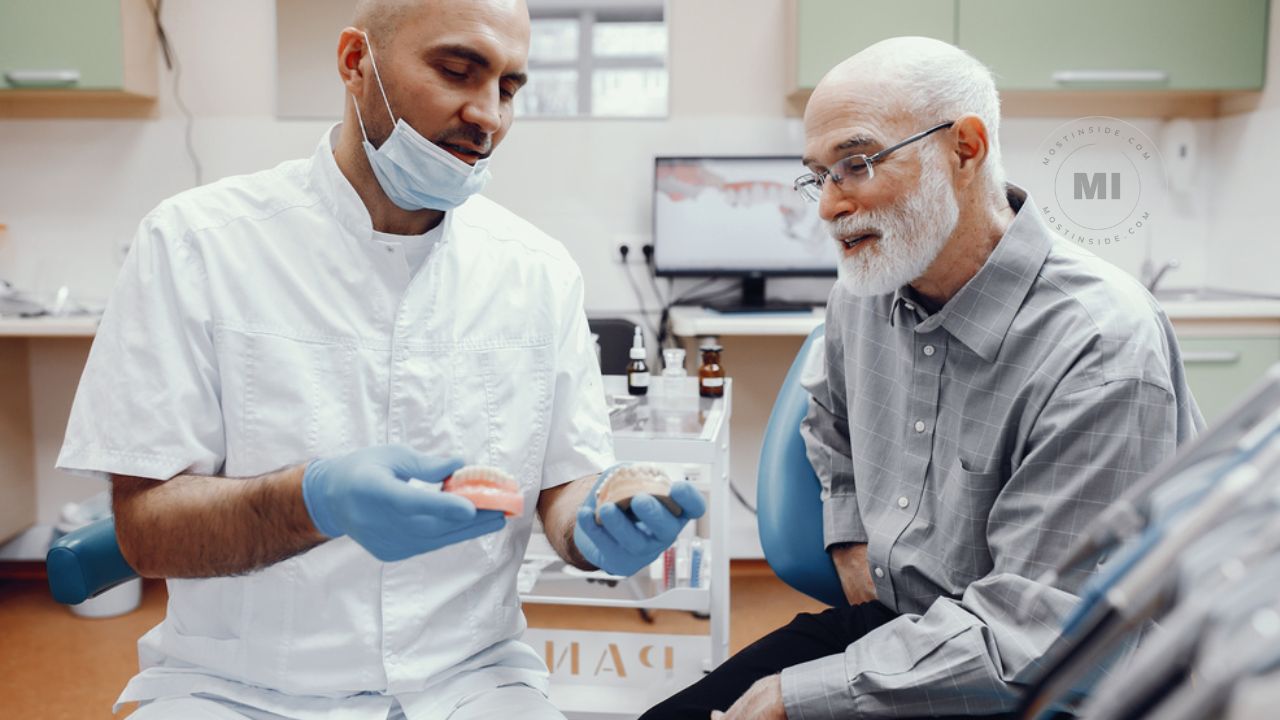A Comprehensive Guide To Getting Your First Set of Dentures
This post was last updated on January 10th, 2023
Tooth loss can result from poor oral hygiene leading to gum disease or decay, trauma, and age-related issues like osteoporosis. Apart from affecting your speech, appearance, and eating, tooth loss can influence your dental occlusion.
Dentures are the best option to replace your fallen teeth. The artificial tooth is placed where your natural one used to be. Dentures look just like your original set of teeth, and they can help restore your beautiful smile and build self-confidence.

Getting your first dentures can be exciting for some and terrifying for others. Whatever emotions you’re having about it, getting prepared with knowledge should help you through the process. Hence, the following is a comprehensive guide to help you when getting your first dentures:
Contents
ToggleWhat Are Dentures
Dentures, also known as dental implants, are screw-like posts made of titanium and used to replace your lost teeth. They’re custom-made in dental laboratories based on an impression of your mouth, teeth, and gum color to give a natural appearance.
Good quality dentures, such as the ones provided by dentists in Blackfoot or other clinics, will feel and look very close to your actual teeth, thanks to today’s technology. The prosthetics work just as your natural teeth would, but it may take some time and learning to get used to them.
Types of Dentures
Depending on the number of teeth you’ve lost, you can get one of the following types of dentures:
- Fixed dentures: They have implants that help permanently fix them to the gums.
- Complete: The dentures cover your whole mouth.
- Partial: The dentures are only put in sections where you lost teeth. They cover the mouth and endure proper function and teeth placement.
Once you visit the dentist and your mouth is healed from the trauma or extraction, you can choose any of the above dentures.
How Dentures Work
Dental implants have two parts; the lower and upper set. The upper set of dentures contains a flesh-colored base that’ll fit over the gums and cover the palate of the mouth. It is similar to the lower set, except it has room to hold your tongue. Once they’ve been put in, you can begin using them just as you would your natural set.

What To Do To Be Prepared For Your First Dentures
Dentures are among the solutions to cover the gaps caused by your missing teeth. It will restore your gorgeous smile and chewing ability. To get ready for your first dentures, here’s what you should do:
-
Consult Your Preferred Dentist
Dental visits are essential for checkups to maintain healthy teeth and a road to a healthier smile. To get your dentures, you need a dentist you’re comfortable with and one you can trust. You can use your everyday dentist or find another one you’re satisfied with.
If you’re getting a new dentist, use these tips:
- Ask for a referral from a friend or your family. Ensure they are experienced with dentures and ask about the referee’s experience there before you decide.
- If you have a dentist in mind, check their credentials and find out if they’re qualified.
- Look at reviews from their previous patients to know whether you can trust them with your oral health.
With these tips, you should be able to get a dentist you can work with to fix your dentures.
-
Identify The Dentures You Need
There are three types of dentures, as stated above. Before going to your appointment, choose what you want. It is an important decision, mainly because it determines how much you pay.
If you still have most of your natural teeth, go for the partial dentures, and if you’ve lost most of your teeth, then you can pick the complete or fixed dentures. Complete and fixed dentures are costly compared to partial ones because they use more materials.
-
Check Your Insurance
Dentures can cost you a reasonable amount to restore your beautiful smile. Depending on your needs, they can be expensive. If you don’t have enough cash to pay for the dentures, you must check your dental insurance policy. Check whether it works and how much it can cover so you can plan your budget well.
Ask your dental insurance provider if the policy covers dentures. Commonly, dentures are among the significant dental operations, and you can get between 50-100% of the total cost covered by insurance.
-
Get Your Mouth Healthy
Your mouth should be as clean and healthy as possible before you receive your first set of dentures. It encourages the healing of your gums and sensitive tissue caused by teeth removal. The following are some things you should do to ensure you have a healthy mouth:
- Eat nutritious food that speeds up healing, such as minerals and vitamins
- Avoid smoking which leaves chemical residue in your mouth and can slow down healing
- Eat soft meals to avoid painful and sore spots on your gums
Your teeth tissue and gums should have healed well before your dentures are put in. If you fit them before healing, the dentures may fail to fit after recovery. Commonly, the healing process should be six to eight weeks.
-
Prepare Mentally
Getting your dentures will not only change your life physically but may include your emotional and mental health. Before fitting your dentures, ensure you’re mentally healthy. You can do the following to prepare yourself mentally:
- Be patient with your recovery process. Ask your dentist for advice on what you can do as you wait for your gums to heal and follow them.
- Learn adjusting strategies such as singing in the bath and reading books aloud. This way, you can build your speech confidence.
- Learn to smile and take compliments. People will complement and applaud your new look. Be ready to accept compliments.
Follow these steps to prepare yourself mentally. If they don’t work, get professional help from a therapist.
Advantages Of Dentures
Having gaps in your mouth can be frustrating, and you can get dentures to fill the gaps. The following are the advantages of having dentures compared to other dental solutions:
- Ensures you have no diet restrictions. After tooth loss, you may avoid hard foods, but with dentures, you can eat anything.
- They fit perfectly into your mouth, making eating and talking easy without discomfort.
- Help restore the functions of your natural teeth and risks of developing other oral health issues.
- Improves the outlook of your smile
- Easy to clean, and you use minimal effort to maintain your oral hygiene.
The benefits of dentures go beyond improving your appearance and include how easy it is to clean and care for them.
What To Expect During The Fitting Process
The denture fitting process is fast and straightforward. The following are the steps likely to take place during the fitting of your dentures:
- Tooth removal
- The impression step is where molds of your mouth are taken to be used in creating dentures specifically for you.
- Bite molds: The dentist uses wax blocks to check that your biting is comfortable. You can also choose the color and shape of your new teeth.
- Wax models: Your new teeth are set in wax, and you can see what your final denture will look like.
- Fitting: Your dentures are fit, and the doctor advises you on how you’ll care for them.
When going for your first denture appointment, ensure you take someone with you and some old photos they can use to choose the denture set that matches your natural teeth.
How Long It Takes To Get Used To Dentures
Getting used to your dentures isn’t going to happen overnight. At first, they’ll feel bulky and awkward as your mouth adjusts. Eating and speaking with them will also be different. You may also have higher saliva flow, and the tongue will seem not to have enough room.
The time it takes for your mouth to get used to the device differs for everyone. However, you get used to the new feeling and get comfortable over time.
Tips For Eating And Speaking With Your Dentures
When you get your dentures, your mouth will take time to adapt to the new device. Your gums get sore, and your eating and speaking will change. The following are tips on eating with your dentures:
- Choose meals you can chew and swallow easily, like fish, cheese, cooked vegetables, and ice cream. Avoid beef strips
- Avoid biting hard with your front teeth
- Take small bites and chew slowly
- Balance the food in your mouth, so the dentures remain in place
- Avoid chewy and hard food like gum and caramel
- Your mouth can’t sense heat as it did before. Getting used to hot food will take time.
After eating, ensure you clean your dentures well.
These are the tips for speaking:
- Read out loud from any writings facing a mirror
- Practice speaking while wearing the dentures
- Before speaking, try to bite down and swallow to set your dentures in place.
With the tips above, you should get comfortable eating and speaking in no time. However, be patient with yourself. Don’t rush the process.
Conclusion
Getting your dentures for the first time is a terrifying and life-changing experience. However, it offers you plenty of benefits, and the process is not as complicated as explained above. With the comprehensive guide above, you can comfortably get your dentures, get back to looking good and make the most of your days.
Most Inside
Most Inside offers high-quality recommendations and valuable updates to enhance all aspects of your life, providing premium guidance and enriching experiences.




